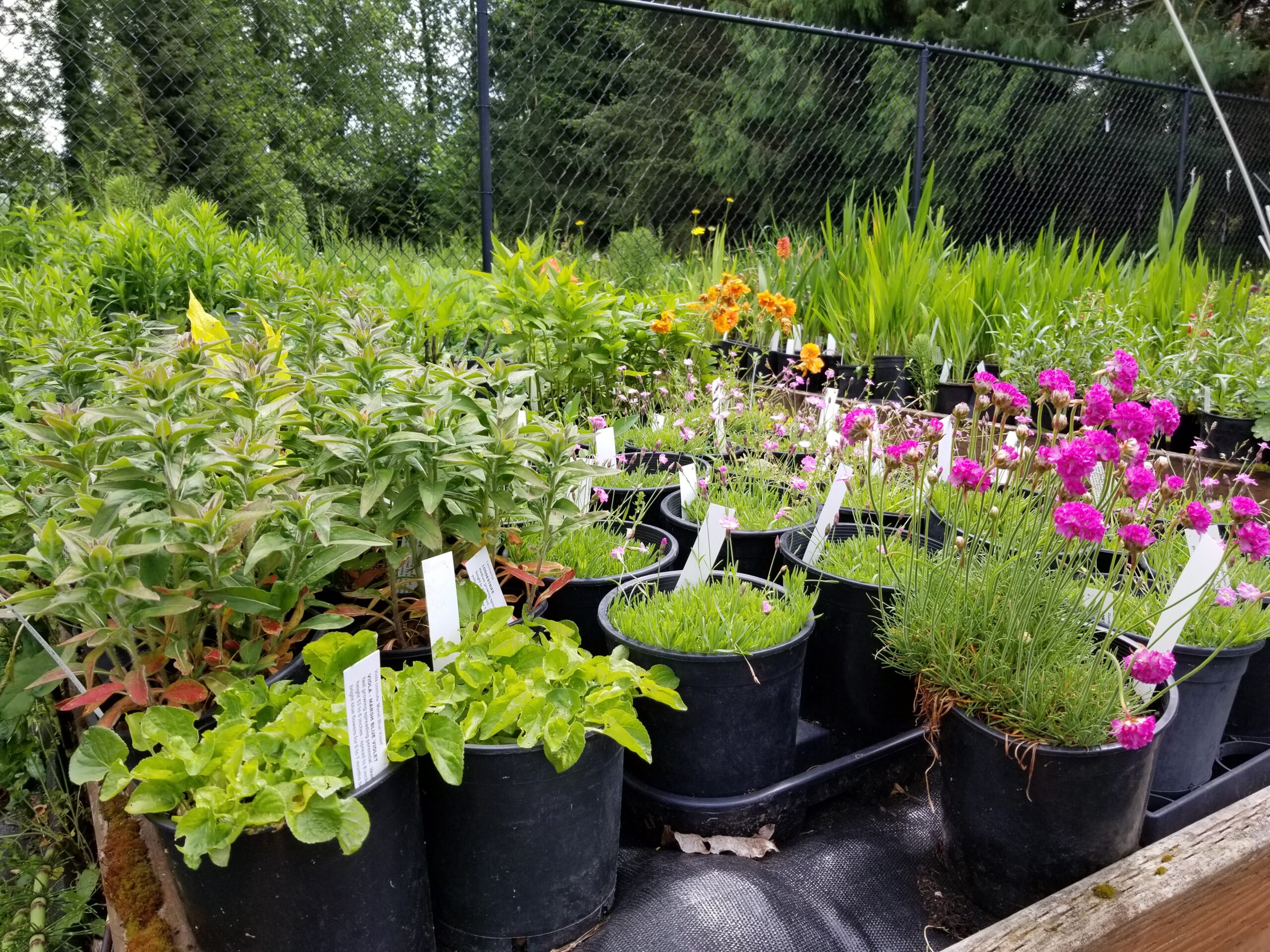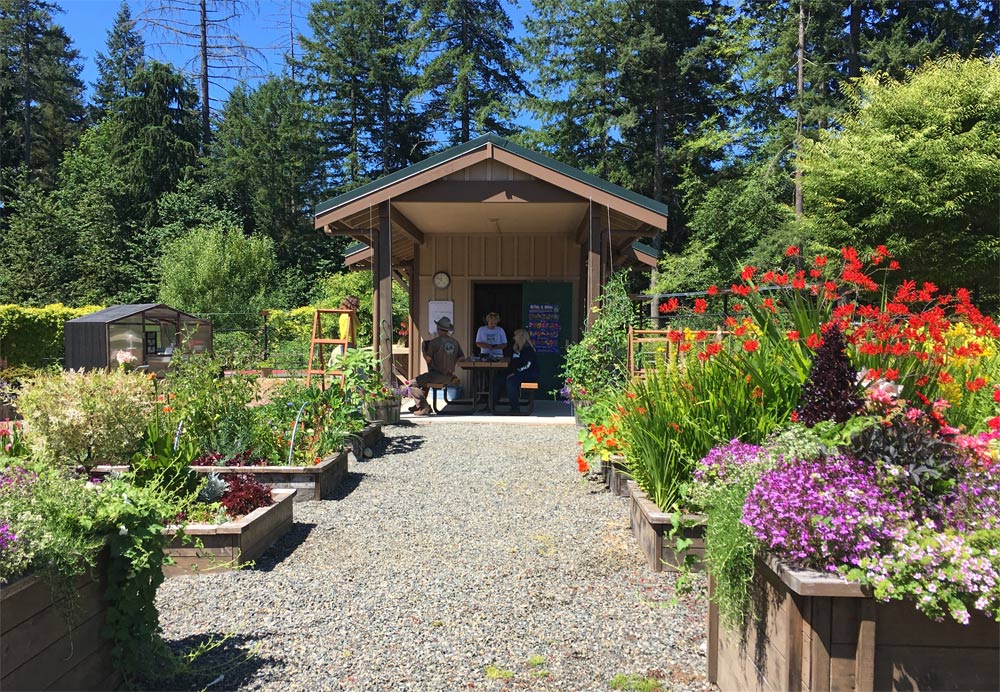Volunteer Community Educators—cultivating plants, people, and communities since 1973
Our annual Plant Sale is just around the corner!
Saturday April 27th, 9am-4pm & Sunday April 28th, 10am-2pm
WSU Puyallup Research and Extension Center (2606 West Pioneer Puyallup, WA).

Master Gardeners are your Community Connectors
Cultivating Plants, People, and Communities since 1973
It all began at Washington State University. A grassroots, sociologic movement that started at Washington State University in 1973 and was emulated across the United States and into Canada and South Korea, the Master Gardener Program is WSU Extension’s flagship volunteer program. Please join us as we celebrate 50 years of the WSU Extension Master Gardener Program around Washington State!
The WSU Extension Master Gardener (MG) Program trains volunteers to empower people and communities to find research-based, innovative solutions that address current challenges. We answer societal questions and directly address inequities in communities by connecting with underrepresented populations and by engaging at the local level via shared passions like growing food and protecting our natural resources. As the first Master Gardener Program in the state, nation and world, Pierce County Master Gardeners continue their commitment to solving global problems by teaching research-based horticulture and environmental stewardship practices to build healthy and resilient communities that are knowledgeable, dynamic and responsive. Cultivating plants, people and communities in Pierce County, Washington since 1973, the MG Program has since been emulated across the U.S. and into other countries around the world.
The WSU Extension Master Gardener Program focuses on nine important sociologic and environmental issues to help mitigate challenges and sustain healthy and resilient communities: Wildfire Preparedness, Water Conservation, Soil Health, Pollinators, Plant Biodiversity, Nearby Nature, Local Food, Climate Change and Clean Water. We know that everyone has a right to food security, clean water, healthy green spaces and protection from the devastating effects of Wildfires and Climate Change.
WSU Extension Pierce County Master Gardeners recognize that people of color, indigenous communities, folks with a low income, immigrants and refugees and folks with unstable housing are disproportionately impacted by environmental upsets. These communities have higher exposure to air and water pollution, less access to local fresh foods, greater impacts of climate change, lack of accessible environments that promote healthy lives. We are committed to serving all people of Pierce County through co-designing inclusive programming and to speaking more openly about how our program priorities intersect with both social and environmental issues.


Pierce County
Golden Group Service Award


Our Vision
Highly recognized, diverse and fully supported, WSU Master Gardener volunteers are the go-to resource for communities seeking research-based, innovative solutions for their ever-changing horticulture and environmental stewardship needs.

Our Values
- We foster and benefit from an atmosphere of diversity and inclusivity because our differences inspire creative thinking and innovative solutions.
- We act with integrity because trust, truthfulness and respect create a healthy and positive culture.
- We are committed to stewardship and sustainability, serving as ethical and responsible agents of our natural resources, human resources, and University resources.
- We collaborate because together we empower healthy and resilient communities.
- We are a dynamic and responsive program where knowledge inspires change.

Our Mission
Engaging university-trained volunteers to empower and sustain diverse communities with relevant, unbiased, research-based horticulture and environmental stewardship education.
- Our Land
WSU Extension Pierce County Master Gardeners acknowledge that our programming takes place on the homelands of Native peoples who have lived in this region from time immemorial. Pierce County includes 1,806 square miles of occupied lands of four Federally recognized Tribes: the Puyallup Tribe, the Nisqually Tribe, the Muckleshoot Tribe, and the Squaxin Island Tribe. As a land grant institution, WSU also recognizes that the Morrill Act of 1862 established land-grant institutions by providing each state with “public” and federal lands. We acknowledge that these lands were taken from Indigenous Peoples by coercive and violent acts, and most disregarded legal treaties and continue that disregard today.
Lushootseed is the language spoken by tribes living and around the Puget Sound region. Its borders extend to: Skagit Valley and Whidbey Island to the north; the east side of Kitsap Peninsula to the west; the drainage basin of South Puget Sound to the south; and the crest of the Cascade Mountains form Mt. Rainer to Mt. Baker to the north .
The names for Lushootseed varies between the tribes. They include:
- dxʷləšucid for the Tulalip/Snohomish and all other Lushootseed tribes to the north
- xʷəlšucid for Muckleshoot and Snoqualmie
- txʷəlšucid for all other tribes
The txʷəlšucid language, their teaching and culture come from the land. These are some of the names, phrases and domains for plants in the txʷəlšucid language. Learn more about the importance of reclaiming language and names associated with the land. təqʷuʔmaʔ (Mt. Tahoma/Rainier)
As stewards of this land and its natural resources, Master Gardeners seek to create respectful and sustainable partnerships with our tribal neighbors. We understand that in order to support healthy communities and a healthy planet that we must first be in healthy relationship with each other.
Please read more about WSU Acknowledgement of America’s First Peoples.
- Our Strategic Plan
WSU Extension Pierce County Master Gardeners recognized the need to better adapt to the needs of our community, especially considering the disruptions and new challenges presented by the COVID-19 pandemic. Engaging our membership, community partners, and those we serve in the Strategic Planning process positioned us to fulfill our Mission better and provide relevant support to our community. The continued updating and refinement of this Strategic Plan sets us up for success now and in the future. We invite you to read the entire plan here.
Our Goals for 2021-2024
- Outdoor Classrooms: To utilize the Gig Harbor, Puyallup and Community Demonstration Gardens as outdoor classrooms for valuable teaching and learning experiences.
- Educational Outreach: To build sustainable relationships with our community through our educational outreach programs like Garden Talks, Plant Clinics and Youth Programming.
- Community Connectors: To provide access to horticulture resources and information that is accessible and inclusive to all of the Pierce County community.
- Our Commitment to Diversity, Equity and Inclusion
WSU Extension is for Everyone!
It is the policy of WSU Extension that no person shall be discriminated against in employment or any program or activity on the basis of race; sex/gender; sexual orientation; gender identity/expression; religion; age; color; creed; national or ethnic origin; physical; mental or sensory disability, including disability requiring the use of a trained service animal; marital status; genetic information and/or status as an honorably discharged veteran or member of the military.
WSU Extension will take specific action to reach out in positive ways to persons who are underrepresented in Extension programs and activities, and to increase diversity in employment and involvement.
CAHNRS commits to cultivating diverse, equitable, inclusive, and safe environments that foster transformative learning experiences, authentic community engagement, and respectful knowledge exchange.
WSU Extension Pierce County Master Gardeners use these 8 Guiding Principles for a more Diverse, Equitable, and Inclusive Program:
- We must feel dissatisfied with the status quo.
- We must have a commitment to diversity that includes time and resources.
- We must have a vision of where we want to be in the future and a process for how to get there.
- We must develop intercultural competency skills and engage in work on personal attitudes based on our societal identities.
- We must begin to understand how our programs and delivery methods have been designed from a dominant cultural perspective, which does not work for most communities.
- We must become a learning organization that is continually recreating itself in partnership with culturally diverse community groups.
- We must invite our traditional audiences along with us as we strive to serve new audiences.
- We must see this work as everyone’s responsibility. It is not just up to our leaders, but each of us, within our sphere of influence.
We must be bold, learn more, and take new risks.
- Our Community Partners
-
- Pierce Conservation District – Supporting just food systems, improving water quality, promoting sustainable agriculture, and recovery wildlife habitat.
- Harvest Pierce County – Everyone deserves access to fresh, healthy, and affordable produce
- Emergency Food Network – Providing Pierce County with a consistent, diverse and nutritious food supply so that no person goes hungry.
- Pierce County Farmers Markets – Freshest, healthiest, and tastiest foods that local farms have to offer while helping the environment and supporting our local community!
- Tacoma-Pierce County Health Department – Dirt Alert and Natural Lawn Care
- Washington State Native Plant Society – The South Sound Chapter serves Pierce, Thurston and adjacent counties with Hikes and special programs.
- PenMet Parks – 98.0-acre site with recreation for children Heritage & Master Gardener Demonstration gardens and 4 miles of trails on the property.
Contact Us
253.798.7170
pierce.mg@wsu.edu
Human Services Office
3602 Pac Ave, Suite 200 Tacoma WA 98418
On the ancestral land of the Puyallup people, spuyaləpabš
